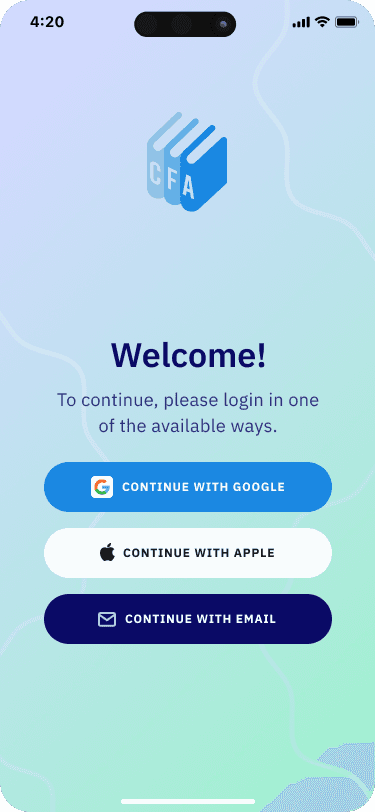Most of us have been programmed with a fatal learning assumption.
We believe mastery flows from comfort to challenge - a smooth, linear progression from basic understanding to advanced application.
But what if everything we know about learning is backwards?
What if the most powerful learning happens when we deliberately engineer our own failure first?
Think about how you learned to walk.
No one gave you a lecture series on bipedal locomotion.
You didn't study foot placement mechanics before taking your first wobbly steps.
You tried. You failed. You adapted.
And through this messy process of productive failure, you mastered one of the most complex motor skills humans possess.
THE COMFORT TRAP AND YOUR CFA EXAM
Our educational system has created generations of "comfort-first" learners.
We've been conditioned to believe that understanding should precede action - that we need to feel "ready" before we engage with challenges.
Psychologist Carol Dweck's research on mindset reveals why this approach is deeply flawed.
Those with a "fixed mindset" see challenges as threats to their competence. They avoid difficulty, seeking instead to maintain the illusion of mastery through careful preparation.
But true learning doesn't work that way.
THE SCIENCE OF PRODUCTIVE FAILURE
In 2016, researcher Manu Kapur published groundbreaking work on what he termed "productive failure." His studies showed that students who attempted to solve complex problems before receiving instruction significantly outperformed those who received traditional teaching.
Why? Because struggle creates neural pathways that:
Activate prior knowledge
Highlight knowledge gaps
Prime the brain for targeted learning
Build resilience and problem-solving capacity
The magic happens in the gap between what we think we know and what reality reveals.
THE LEARN METHODOLOGY FRAMEWORK
Drawing from cognitive science and practical application, here's how to implement productive failure in your CFA Level 1 exam prep:
Quick Overview (5 minutes)
Build basic conceptual scaffolding
Identify key terms and relationships
Don't seek mastery yet
Diagnostic Challenge (15 minutes)
Attempt complex problems
Embrace confusion
Document specific points of failure
Gap Analysis (10 minutes)
Map knowledge gaps
Identify pattern of mistakes
Create targeted learning plan
Focused Learning (30 minutes)
Address specific weaknesses
Connect new information to failure points
Build from confusion to clarity
THE PSYCHOLOGICAL BARRIERS
Famous psychologist Daniel Kahneman explains that our "System 1" thinking craves certainty and comfort. This creates several barriers to productive failure:
Ego Protection
Fear of being wrong
Avoidance of difficulty
Need for immediate competence
False Progress Bias
Mistaking familiarity for understanding
Preferring passive consumption to active struggle
Overvaluing preparation time
Comfort Addiction
Resistance to productive struggle
Seeking validation over growth
Avoiding cognitive strain
META-LEARNING IMPLICATIONS
The productive failure approach reveals deeper truths about human development:
1. Growth Requires Resistance Just as muscles need resistance to grow stronger, minds need challenge to develop capacity.
2. Confusion is Clarity's Predecessor Clear understanding emerges from the fog of initial confusion.
3. Speed Through Struggle Counter-intuitively, embracing initial difficulty accelerates long-term progress.
THE DECISION POINT
You stand at a crossroads in your learning journey.
Path 1: Continue the comfortable approach of passive preparation before engagement.
Path 2: Embrace productive failure and accelerate your growth through structured struggle.
Ask yourself:
What's the real cost of avoiding difficulty?
How much time am I wasting on ineffective preparation?
Am I ready to trust the process of productive failure?
IMPLEMENTATION PROTOCOL
Choose your next learning objective
Set a 5-minute timer for overview review
Immediately attempt challenging problems
Document specific failure points
Create targeted learning plan
Execute focused study
Retest within 24 hours
Remember what psychologist Anders Ericsson discovered about deliberate practice: It's not about time invested, but about the quality of struggle encountered.
CLOSING CHALLENGE
What CFA Level 1 exam topic have you been avoiding because you don't feel "ready"?
Commit to applying the productive failure approach to this topic within the next 24 hours.
Your future self will thank you for embracing the struggle today.
P.S. Every day you delay implementing this approach is another day of suboptimal learning.
Your competitors are already discovering the power of productive failure.
Will you join them in the fast lane of accelerated mastery, or remain stuck in the comfort zone of inefficient preparation?
"The impediment to action advances action. What stands in the way becomes the way." - Marcus Aurelius
Onwards & Upwards Candidates!


